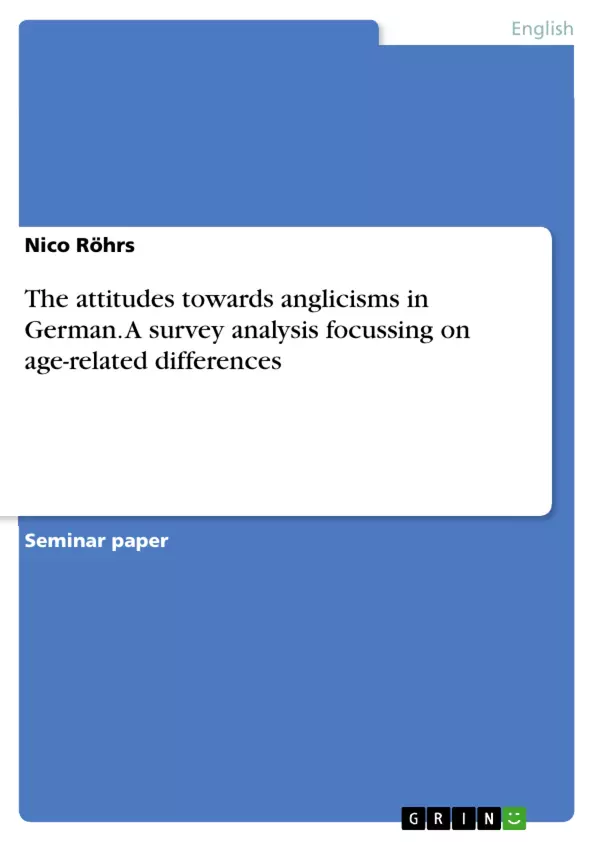This paper is concerned with the subject of anglicisms. Anglicisms are lexical items, which are transferred into our everyday language use. They are surrounded by a constant debate about their necessity. While linguists mostly appreciate their advantages, linguistic purists regard them as a threat and try to remove or limit them.
Through analyzing a survey, this study presents the attitudes towards anglicisms in German. Thereby, the influence the participants’ age has on their attitudes is especially focused on. After setting the scene by giving an overview about already existing research on the spread of English, anglicisms in German and linguistic purism, the survey analysis shows that older generations’ attitudes towards anglicisms tend to be more negative. As the paper focused on the social characteristic ‘Age’, future studies could discuss the influence class affiliation or education has on the attitudes towards anglicisms.
Inhaltsverzeichnis (Table of Contents)
- 1 Introduction
- 2 Previous research
- 2.1 The spread of English
- 2.2 Anglicisms (in German)
- 2.3 Linguistic purism
- 3 Methodology
- 4 Results
- 5 Discussion
- 6 Conclusion
Zielsetzung und Themenschwerpunkte (Objectives and Key Themes)
This paper investigates the attitudes towards anglicisms in German, particularly focusing on the influence of age on these attitudes. The study aims to answer the research question: Are older persons' attitudes towards anglicisms in German more negative than younger persons'? To achieve this, the study will analyze a survey and present the results within the context of existing research on the spread of English, anglicisms, and linguistic purism.
- The impact of anglicisms on the German language
- Attitudes towards anglicisms across different age groups
- The role of linguistic purism in shaping attitudes towards anglicisms
- The influence of English as a global language
- The relationship between language and national identity
Zusammenfassung der Kapitel (Chapter Summaries)
- Introduction: This chapter introduces the topic of anglicisms and their impact on the German language. It highlights the contrasting perspectives on anglicisms, with some viewing them as a threat to the language and others seeing them as necessary and natural. The research question is presented, focusing on the potential difference in attitudes towards anglicisms between older and younger generations.
- Previous Research: This chapter delves into existing research on the spread of English and its role as a global language. It examines the historical development of English's expansion and the influence of English on other languages, including the emergence of anglicisms. It also discusses the concept of linguistic purism and its impact on language use.
Schlüsselwörter (Keywords)
This study focuses on the following key terms and concepts: anglicisms, linguistic purism, age-related differences, attitudes towards language, language change, language decay, global language, English as a lingua franca, German language, national identity, cultural influence, survey analysis.
Frequently Asked Questions
What is the focus of this study on anglicisms?
The study focuses on attitudes towards anglicisms in the German language, specifically looking at how age influences these perceptions.
What are anglicisms?
Anglicisms are lexical items or words transferred from English into everyday German language use.
Are older people more critical of anglicisms?
Yes, the survey analysis shows that older generations tend to have more negative attitudes towards the use of anglicisms compared to younger people.
What is linguistic purism?
Linguistic purism is the practice of defining or recognizing one variety of a language as being purer than others, often trying to remove foreign influences like anglicisms.
How does English influence national identity in Germany?
The paper discusses the relationship between language use and national identity, and how the spread of English as a global lingua franca affects this.
- Arbeit zitieren
- Nico Röhrs (Autor:in), 2020, The attitudes towards anglicisms in German. A survey analysis focussing on age-related differences, München, GRIN Verlag, https://www.grin.com/document/983571



